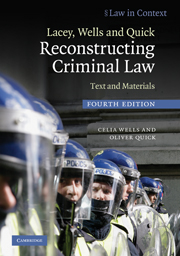Book contents
- Frontmatter
- Contents
- Preface
- Table of cases
- Table of statutes
- Section I Approaching Criminal Law
- 1 Images of Criminal Law
- 2 Criminal Laws in Context
- 3 Foundations of Criminal Law
- Section II Law, Order and Security
- Section III Interpersonal Violence; Drugs and Alcohol Abuse; Offence Preparation and Participation
- Section IV Property and Propriety
- Section V Regulating Sexuality and Bodily autonomy
- Section VI Making a Killing
- Bibliography
- Index
- References
3 - Foundations of Criminal Law
from Section I - Approaching Criminal Law
Published online by Cambridge University Press: 05 June 2012
- Frontmatter
- Contents
- Preface
- Table of cases
- Table of statutes
- Section I Approaching Criminal Law
- 1 Images of Criminal Law
- 2 Criminal Laws in Context
- 3 Foundations of Criminal Law
- Section II Law, Order and Security
- Section III Interpersonal Violence; Drugs and Alcohol Abuse; Offence Preparation and Participation
- Section IV Property and Propriety
- Section V Regulating Sexuality and Bodily autonomy
- Section VI Making a Killing
- Bibliography
- Index
- References
Summary
Due process and human rights
We suggested in Chapter 1 that modern criminal law is best understood in relation to a distinctive set of procedures. This focus on ‘due process’ has been driven over the last 150 years both by the expansion of criminal law's scope and by liberal ideas about the rights of individuals vis-à-vis the state. More recently, the salience of due process has been thrown into relief by the incorporation of the European Convention of Human Rights (ECHR) into domestic law through the Human Rights Act 1998 (HRA). Under this legislation, the courts must, wherever possible, interpret domestic law in a way which conforms to the standards embodied in the Convention: where they are unable to do so, they must make a declaration of incompatibility. At this point, the onus shifts to Parliament to decide how to respond.
The Human Rights Act provides a distinctive foothold for internal critique of criminal law, by introducing within criminal law standards which were previously external to it. In the other chapters of this book, we shall consider the various ways in which human rights standards may affect the substantive criminal law. Here we are concerned with the implications of the Human Rights Act for criminal procedure and for the ideals of due process which are central to the legitimation of modern criminal law.
- Type
- Chapter
- Information
- Lacey, Wells and Quick Reconstructing Criminal LawText and Materials, pp. 72 - 126Publisher: Cambridge University PressPrint publication year: 2010

